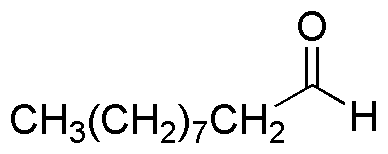Decanal is widely utilized in research focused on:
- Fragrance Industry: Decanal is a key ingredient in perfumes and fragrances due to its pleasant citrus-like aroma. It enhances scent profiles, making it popular among fragrance manufacturers.
- Flavoring Agents: This compound is used in food products as a flavoring agent, particularly in citrus-flavored items, providing a natural taste that appeals to consumers.
- Cosmetic Formulations: In cosmetics, decanal serves as a fragrance component and skin-conditioning agent, improving the sensory experience of lotions and creams.
- Research Applications: Decanal is utilized in various scientific studies, particularly in organic chemistry for synthesizing other compounds, showcasing its versatility in laboratory settings.
- Biotechnology: Its role in biotechnological applications includes serving as a solvent or reagent in the synthesis of bioactive compounds, aiding researchers in developing new pharmaceuticals.
General Information
Properties
Safety and Regulations
Applications
Decanal is widely utilized in research focused on:
- Fragrance Industry: Decanal is a key ingredient in perfumes and fragrances due to its pleasant citrus-like aroma. It enhances scent profiles, making it popular among fragrance manufacturers.
- Flavoring Agents: This compound is used in food products as a flavoring agent, particularly in citrus-flavored items, providing a natural taste that appeals to consumers.
- Cosmetic Formulations: In cosmetics, decanal serves as a fragrance component and skin-conditioning agent, improving the sensory experience of lotions and creams.
- Research Applications: Decanal is utilized in various scientific studies, particularly in organic chemistry for synthesizing other compounds, showcasing its versatility in laboratory settings.
- Biotechnology: Its role in biotechnological applications includes serving as a solvent or reagent in the synthesis of bioactive compounds, aiding researchers in developing new pharmaceuticals.
Documents
Safety Data Sheets (SDS)
The SDS provides comprehensive safety information on handling, storage, and disposal of the product.
Product Specification (PS)
The PS provides a comprehensive breakdown of the product’s properties, including chemical composition, physical state, purity, and storage requirements. It also details acceptable quality ranges and the product's intended applications.
Certificates of Analysis (COA)
Search for Certificates of Analysis (COA) by entering the products Lot Number. Lot and Batch Numbers can be found on a product’s label following the words ‘Lot’ or ‘Batch’.
*Catalog Number
*Lot Number
Certificates Of Origin (COO)
This COO confirms the country where the product was manufactured, and also details the materials and components used in it and whether it is derived from natural, synthetic, or other specific sources. This certificate may be required for customs, trade, and regulatory compliance.
*Catalog Number
*Lot Number
Safety Data Sheets (SDS)
The SDS provides comprehensive safety information on handling, storage, and disposal of the product.
DownloadProduct Specification (PS)
The PS provides a comprehensive breakdown of the product’s properties, including chemical composition, physical state, purity, and storage requirements. It also details acceptable quality ranges and the product's intended applications.
DownloadCertificates of Analysis (COA)
Search for Certificates of Analysis (COA) by entering the products Lot Number. Lot and Batch Numbers can be found on a product’s label following the words ‘Lot’ or ‘Batch’.
*Catalog Number
*Lot Number
Certificates Of Origin (COO)
This COO confirms the country where the product was manufactured, and also details the materials and components used in it and whether it is derived from natural, synthetic, or other specific sources. This certificate may be required for customs, trade, and regulatory compliance.

